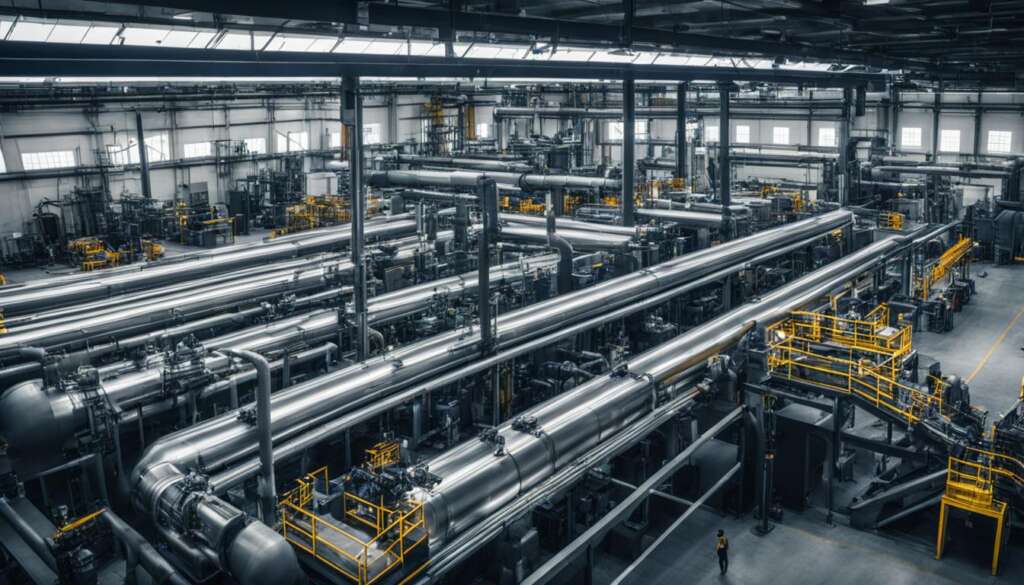Table of Contents
Process manufacturing is a method used in the production of goods. It involves a series of steps that transform raw materials into finished products.
The process manufacturing approach is usually employed in industries where the production of goods involves chemical reactions or mixing of ingredients to form a final product.
In this article, we will explore the concept of process manufacturing, its importance in the production of goods, and how it differs from other manufacturing methods.
Key Takeaways
- Process manufacturing involves a series of steps that transform raw materials into finished products.
- This method is commonly employed in industries where the production of goods involves chemical reactions or mixing of ingredients to form the final product.
- The process manufacturing approach is vital in achieving efficient production and consistent product quality.
- The workflow of process manufacturing involves several stages, from raw material acquisition to final product packaging and distribution.
- Quality control and regulatory compliance play a critical role in process manufacturing to ensure the safety and effectiveness of the final product.
Defining Process Manufacturing
To understand process manufacturing, we must first define it. Process manufacturing is a production method that involves the use of recipes, formulas, and standardized procedures to create products in bulk quantities. Unlike other manufacturing methods, which produce discrete items, process manufacturing deals with liquids, powders, and other materials that flow and transform during production.
The key characteristics of process manufacturing are:
- Use of formulas and recipes
- Standardized procedures
- Production batches
- Use of automated equipment
Process manufacturing is commonly employed in industries such as chemical, pharmaceutical, and food and beverage.
The Process Manufacturing Workflow
The process manufacturing workflow is a critical aspect of the overall process. It involves a series of steps that ensure the efficient and successful transformation of raw materials into finished goods. The stages of production in process manufacturing can be broken down into the following:
| Stage | Description |
|---|---|
| Raw Material Acquisition | The first stage involves sourcing the raw materials needed for production. These can include natural resources, chemicals, and other necessary components. The materials must meet specific quality standards to ensure the end product’s integrity. |
| Manufacturing Process | This stage involves processing the raw materials into the finished product. Standardized procedures, formulas, and recipes are used to maintain consistency in the product’s quality across batches. The manufacturing process may involve chemical reactions, mixing, heating, or cooling, depending on the product’s nature and complexity. |
| Quality Control | Quality control is essential to ensure the product meets or exceeds specific quality standards. Process manufacturers monitor product quality at various stages of production, including during manufacturing, packaging, and shipping. If any defects are detected, they are corrected immediately to avoid costly mistakes. |
| Product Packaging and Distribution | The final stage involves packaging the finished product and preparing it for distribution. The packaging must provide adequate protection and comply with regulatory requirements. Once packaged, the product is distributed to wholesalers, retailers, or directly to consumers. |
The manufacturing workflow must be closely monitored and managed to ensure consistency in quality and production efficiency. Process manufacturers may use various tools, such as process automation, to streamline and optimize the workflow process, thereby achieving high production efficiency and maintaining product quality.
Conclusion
In conclusion, process manufacturing plays a significant role in achieving production efficiency and maintaining consistent product quality. By using standardized procedures and strict quality controls, process manufacturing ensures that the final product meets the required specifications. This, in turn, reduces the need for costly rework or product recalls, resulting in cost savings for the manufacturer.
Moreover, process manufacturing enables manufacturers to optimize their production processes, leading to increased efficiency and productivity. By automating repetitive tasks and streamlining the workflow, process manufacturing reduces the production time, allowing manufacturers to produce more products in less time. This enables manufacturers to respond quickly to changing market demands and stay ahead of their competition.
Looking ahead, the future of process manufacturing is bright. With advancements in technology, such as the Industrial Internet of Things (IIoT) and artificial intelligence, process manufacturing is becoming more efficient and effective than ever before. By leveraging these technologies, manufacturers can further improve their production processes, leading to even higher levels of production efficiency and cost savings.
FAQ
What is process manufacturing?
Process manufacturing is a method of production used for creating goods that involve the transformation of raw materials using formulas, recipes, and standardized procedures. It is commonly employed in industries such as food and beverage, pharmaceuticals, and chemicals.
How does process manufacturing differ from other manufacturing methods?
Unlike other manufacturing methods, process manufacturing relies on recipes, formulas, and standardized procedures to produce goods. It is characterized by its emphasis on batch production, where raw materials are transformed into finished products through a series of sequential steps.
What is the workflow of process manufacturing?
The workflow of process manufacturing involves several stages. It starts with the acquisition of raw materials, which are then processed and transformed according to the defined recipes or formulas. The production process includes mixing, blending, heating, cooling, and other necessary operations. The final products are then packaged and distributed for sale.
Why is quality control important in process manufacturing?
Quality control is crucial in process manufacturing to ensure that the products meet the required standards and specifications. It helps identify and rectify any deviations or defects during the production process, resulting in consistent product quality. With adequate quality control measures, manufacturers can minimize waste, reduce rework, and enhance customer satisfaction.
What are the benefits of process manufacturing?
Process manufacturing offers several benefits, including improved production efficiency, consistent product quality, and better traceability. By following standardized procedures and incorporating quality control measures, manufacturers can optimize their operations, minimize errors, and enhance overall productivity.







